
$50 million needed to tackle food insecurity in Ethiopia, says UN
“The outlook for 2016 is very grim," said Amadou Allahoury, FAO Representative for Ethiopia, adding that "continued drought throughout the beginning of 2016 also means pasture will become even more scarce, which will negatively impact livestock keepers that rely on those grazing lands and water points for their food security.”
The current El Niño pattern, being the strongest ever recorded, has caused severe drought in the Horn of Africa nation, resulting in crop reduction by 50 to 90 per cent; even failure in some regions. Thus, some 10.2 million people are food insecure and farmers have been left vulnerable without valuable seeds for upcoming planting season.
Moreover, livestock will become leaner, sicker and less productive and perish, as worsening access to pasture and water continues, according to FAO’s latest assessments. Meanwhile, malnutrition rates have spiked and the number of severe acute malnutrition admissions for children is now the highest ever reported.
In response, FAO has outlined an emergency roadmap aiming at assisting 1.8 million farmers and livestock keepers, reducing food gaps, and restoring agricultural production and incomes in 2016.
“$50 million is now sought from the international community by FAO to reach and this is an immediate need because we have to be there in the next few weeks for them for the farmers and pastoralists to start agriculture and this is a very urgent need for assistance,” Shukri Ahmed, FAO Senior Economist, appealed in a video interview.
First, FAO plans to assist 131,500 households through agricultural production, especially for the first half of 2016. This includes emergency seed distribution, small-scale irrigation and backyard gardening initiatives, support for seed producers and women’s empowerment.
Next, some 293,000 households will benefit from FAO’s livestock interventions, such as the distribution of emergency animal feed, vaccination drives, restocking of 100,000 goats and sheep to vulnerable households, as well as cash-for-livestock exchange programmes.
Another response plan will focus on resilience-building for 30,700 households, including cash-for-work programmes that will boost families’ incomes and improve critical local infrastructure and water access for livestock.
Further, FAO and partners are supportive for the ongoing governmental productive capacity rebuilding programmes.
“In Ethiopia, El Niño is not just a food crisis – it’s above all a livelihood crisis,” said Dominique Burgeon, Leader of FAO’s Strategic Programme on Resilience and Director of FAO’s Emergencies and Rehabilitation Division.
“And we need to intervene now to protect and rebuild these livelihoods and people's capacity to produce, to prevent families from becoming long-term dependent on food aid,” Burgeon underscored.
Photo: WFP/Stephanie Savariaud/www.justearthnews.com
Support Our Journalism
We cannot do without you.. your contribution supports unbiased journalism
IBNS is not driven by any ism- not wokeism, not racism, not skewed secularism, not hyper right-wing or left liberal ideals, nor by any hardline religious beliefs or hyper nationalism. We want to serve you good old objective news, as they are. We do not judge or preach. We let people decide for themselves. We only try to present factual and well-sourced news.







